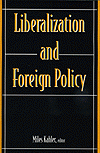|
|
|
|
by Miles Kahler (ed.)

What characteristics distinguish liberal democracies from other types of regimes? Are democracies more peaceful by nature than autocracies? How does a nation's economic and political system influence its foreign policy? These are the questions that occupy Liberalization and Foreign Policy, nine original essays by eminent scho9lars who illuminate a new agenda in international relations.
Filling the gaps in existing international relations theory--which has failed to explain adequately such upheavals as the dissolution of the Soviet Union and the end of the Cold War--this collection of essays explores the effects political and economic liberalization has on foreign policy.
Addressing the global wave of political and economic liberalization that has arisen during the last twenty years, the contributors focus on three subjects. First, the reexamine the "distinctiveness of democratic dyads," exploring the reasons foreign policies of liberal democracies toward one another are so markedly different from those practiced by nondemocratic regimes.
Next they describe the foreign policies of nations in transition or those undergoing political or economic liberalization, comparing and contrasting them with established democracies.
Finally, they clarify a noteworthy outcome of economic liberalization: the adoption of external cooperative strategies and the engagement with international institutions to manage the effects of growing external economic ties.
With its focus on the vital links between democratization, economic reforms, and foreign policy, this book is indispensable for scholars and students of international relations.
About the author.